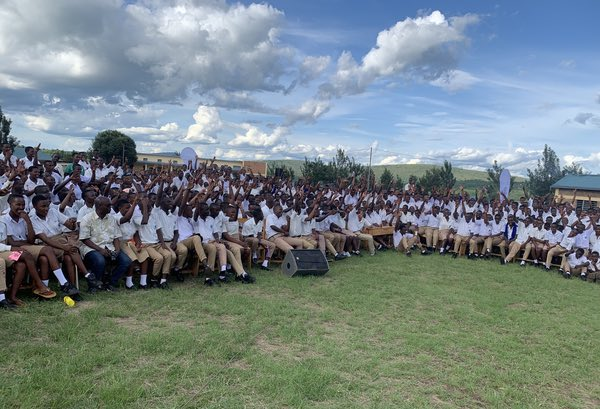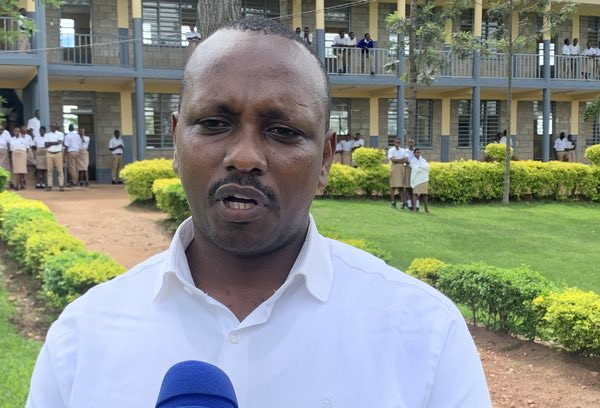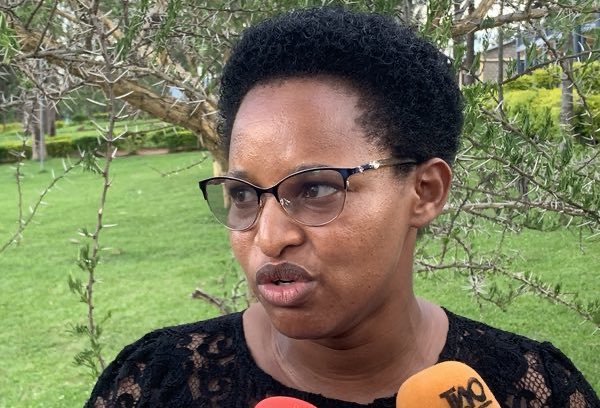[ad_1]

Vice-Mayor Marcelline Mukamana
Kabarore(Gatsibo): During the HIV/AIDS sensitization tour in Eastern Province, the Rwanda Biomedical Center (RBC) arrived at TTC Kabarore School, Gatsibo District, with a team of journalists and of theater actors. During the show, the Vice-Mayor of Social Affairs of Gatsibo, Marcelline Mukamana, welcomed the initiative of RBC to tackle HIV/AIDS, as it is the objective of the District of Gatsibo which recorded 892 pregnancies of young girls in 2022, according to a MIGEPROFE report.

“We catch these pregnancies after various traps of money and telephones that we offer to careless young girls. The 892 pregnancies came from young girls between the ages of 14 and 18, under conditions of unprotected sex. Our strategy following this increase in pregnancies consists in sensitizing our partners in order to be close to young people and to initiate them to say no to temptations which put their lives in danger”, she indicates.
The Vice-Mayor made these remarks on the sidelines of the concert and the theater play presented to the 544 students of TTC Kabarore, to which were added the 344 other students of the Higher Cycle of the neighboring Bihanga School Group, in the very Center of Kabarore. That’s an audience of over 900 people who followed RBC’s messages and drama.
“Protecting oneself from HIV/AIDS means avoiding prostitution among young people, as well as the non-use of condoms. Family conflicts are at the root of bad behavior and child prostitution. Parents no longer have time to discuss with children, in order to provide them with good guidance. The District has launched a campaign to encourage parents and young people to be more vigilant. After Kabarore, tomorrow we will be in Kiramuruzi to awaken young people and parents to more of the fight against HIV/AIDS. We call on partners to get involved in raising awareness against HIV/AIDS. It is an opportunity to invite parents to be more responsible and to stop conflicts in order to better educate children”, continued the Vice-Mayor of Social Affairs, Marcelline Mukamana.
Asked about couples ready to marry, but who find themselves with discordant tests on the eve of their marriage, Vice-Mayor Mukamana noted that Health Centers are equipped with counseling services for future spouses.
“The Health Centers provide sexual and reproductive health education to future spouses. When voluntary HIV tests prove discordant, it is up to the future spouses to decide whether they want to continue living together. These Health Centers show them what they can do and nothing hinders their sexual and loving union. “, did she say.
For the Director of TTC Kabarore, Gilbert Manishimwe, this school has a Higher Cycle in three sections, and it trains future educators in kindergarten and primary school. The school has 264 girls and 280 boys, all aged between 14 and 23 years old. The school was established in 2015. It has been in operation for eight years.

“We have anti-AIDS clubs in which the pupils meet every Sunday under the direction of a supervisor and the prefect of studies and discipline. Presentations revolve around HIV/AIDS prevention, and sexual and reproductive health. Cases of stigmatization of people on ARVs do not exist in the School, because there are no students living with this virus. Our clubs insist on prevention against HIV/AIDS and the horrors of this scourge. As well as on the mode of transmission, and the killing of patients in advanced stages. Students know to avoid prostitution, unprotected sex, transmission through the blood of an infected person or through sharp tools like razor blades that have been in contact with an infected person. Sometimes, we invite the heads of hospitals or health centers to give talks in our clubs against AIDS”, he says.
The Director of the Bihanga School Group informed that his school has anti-AIDS clubs which train its students to fight against HIV/AIDS.
The school has no children on ARVs and has never recorded any pregnancies among its young girls. Children are educated to avoid alcohol and drugs, as this is also the path that leads to AIDS.
“Young girls have to be more careful, because their age group of 15 to 25 years old is three times more infected than boys,” informed RBC’s behavior change officer, Aimé Ernest Nyilinkindi. (END)
Related
[ad_2]
Source link



